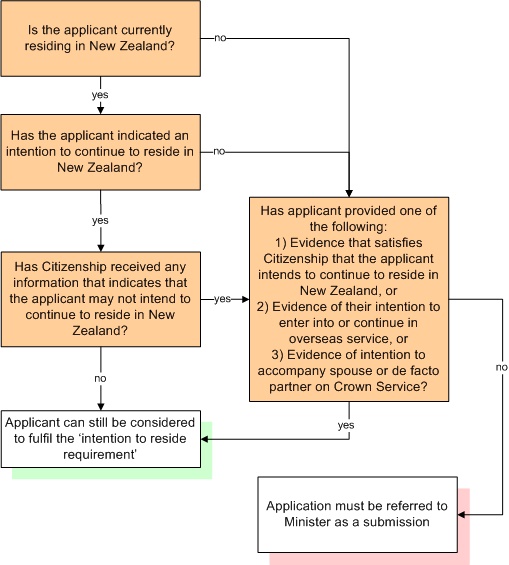






Policy — Intention to continue to reside, or work overseas, if granted citizenship
Page 1 of 1
Cohesion
Newsfeed
OneDrive
Sites
Vi Saena
Home
Teams
Functions
Enabling Services
Programmes and Projects
Governance
Neighbourhoods
Tuwhiria te Tikanga
Policy — Intention to continue to reside, or work overseas, if granted citizenship
This article outlines relevant legislation and policy relating to the 'intention' requirement of the Citizenship Act 1977.
In this article:
• Legislation
• Intention to continue to reside in New Zealand
• Schedule or submission
• Assessing intention to reside for schedule purposes
Released
• Working outside New Zealand in Crown service or for a specified organisation
• Failure to meet requirement
• Rescinding approval
• Related articles
Legislation
The intention to continue to reside requirement for New Zealand citizenship by grant is covered in s ection 8(2)(f) and 8(9) of the Citizenship Act 1977.
Section 8 of the Citizenship Act 1977
Back to contents
8(2)(f)
that the applicant intends, if granted New Zealand citizenship, either—
(i)
to continue to reside in New Zealand; or
(ii)
to enter into or continue in Crown service under the New Zealand Government, or service under an international organisation of which the New Zealand Government is a member, or service in the employment of a person, company, society, or other body of persons resident or established in New Zealand.
8(9)
For the purposes of subsection (2)(f),—
(a) the intention referred to in subsection (2)(f)(i) must be a continuing intention throughout the period from the date of application for citizenship until the date that the applicant becomes a citizen under section 12:
(b) the Minister may treat an applicant as intending to continue to reside in New Zealand if the applicant intends to accompany his or her New Zealand citizen spouse or civil union or de facto partner on Crown service for the New Zealand Government or public service for the Government of the Cook Islands, Niue, or Tokelau.
Intention to continue to reside in New Zealand
Citizenship by grant applicants must satisfy the Life and Identity Services Officer (LISO) that they intend to continue to reside in New Zealand.
under
Back to contents
Assessing intention to continue to reside for schedule purposes
The following factors are taken into account when assessing whether the applicant meets the requirement for schedule purposes:
• The applicant is currently residing in New Zealand.
• The applicant has stated on the application that they intend to continue to reside in New Zealand.
• The LISO has not received any information that would suggest the applicant may not intend to continue to reside in New Zealand.
Follow these guidelines to assist with determining an applicant's intention to reside:
Guideline — Determining intention to continue to reside for citizenship schedule
Guidelines — Determining intention to continue to reside after approval
Back to contents
Working outside New Zealand in Crown service or for a specified organisation
the
An applicant can be considered to meet the intention requirement for schedule purposes if they:
• intend to reside outside New Zealand in Crown service or working for a specified organisation, and
• they have provided evidence of their employment outside New Zealand,
or
• are accompanying a New Zealand citizen spouse or partner working overseas on Crown service, and
• have provided evidence of their New Zealand citizen spouse or partner working outside New Zealand on Crown Service.
A specified organisation is:
Official
• an international organisation of which the New Zealand Government is a member
• a person, company or society resident or established in New Zealand.
See Guideline-Determining intention - sections 8(2)(f)(ii) and 8(9)(b) - working overseas or accompanying partner on Crown service (cohesion.net.nz) for more information on how to determine if an applicant meets the requirements of sections 8(2)(f)(ii) or 8(9).
Failure to meet requirement-Submission
If an applicant is unable to fulfill, or cannot clearly fulfill, the intention requirement for schedule purposes, then the application must be referred to the Minister as a submission. ,
Back to contents
Rescinding approval
The Minister can rescind the approval of a citizenship by grant application at any time before the date that an applicant becomes a citizen if they are no longer satisfied that the applicant meets the intention requirement.
Back to contents
Related articles
Information
Guideline — Determining intention to continue to reside for citizenship schedule purposes
Guidelines — Determining intention to continue to reside after approval
Guideline-Determining intention - sections 8(2)(f)(ii) and 8(9)(b) - working overseas or accompanying partner on Crown service (cohesion.net.nz)
Policy — Grant of citizenship by reason of exceptional circumstances and public interest
Last updated 9/1/2024
Click here to provide feedback on this page
Act
https://dia.cohesion.net.nz/Sites/KM/TTT/MGMNT/Pages/Policy%20%E2%80%94%20I... 23/05/2024







Guideline - Determining intention to continue to reside for citizenship schedule purposes
Page 1 of 3
Cohesion
Newsfeed
OneDrive
Sites
Vi Saena
Home
Teams
Functions
Enabling Services
Programmes and Projects
Governance
Neighbourhoods
Tuwhiria te Tikanga
Guideline - Determining intention to continue to reside for citizenship schedule purposes
Use these guidelines to assist with determining an applicant's intention to reside for placement on a schedule, including cases where an applicant:
Collapse all sections
Expand all sections
• is currently overseas
• has indicated that they intend to travel overseas.
In order for an application to be referred to the Minister on a schedule, the applicant must demonstrate that despite an intended overseas absence the applicant clearly has an intention to continue to reside in New Zealand.
Note:
Released
Intention is not a requirement for applicants under the Western Samoa Act.
An applicant can go overseas for a period and still be able to meet the intention requirement. Each case should be assessed on a case-by-case basis and it is important to look at the nature and duration of the applicant’s overseas absence. In addition,
where there are questions about an applicant’s intention to reside, the applicant should supply evidence that shows, and maintains from the date of application until becoming a citizen, an intention to reside in New Zealand.
Note:
If a child 15 and under does not intend to continue to reside in New Zealand, they may be considered to meet the intention requirement if the parent, whom they are or will be residing with overseas, meets the requirements of section 8(2)(f)(ii).
Section 8(2)(f)(ii)
The applicant intends, if granted New Zealand citizenship, to enter into or continue in Crown service under the New Zealand Government, or service under an international organisation of which the New Zealand Government is a member, or
service in the employment of a person, company, society, or other body of persons resident or established in New Zealand.
The parent does not need to be applying for citizenship, but will need to provide evidence that they are working overseas for an organisation as specified in section 8(2)(f)(ii). See Guidelines - Determining intention under section 8(2)(f)(ii) of Citizenship
Act 1977. LISOs may wish to discuss the application at the complex cases group for further review and advice, if there are questions or concerns about a child's intention to reside.
What does ‘continue to reside’ mean?
The word ‘continue’ refers to several things. The applicant:
• was residing in New Zealand before lodging their application
• has an intention to continue to reside in New Zealand once granted citizenship, and
• maintains this intention until they become a citizen.
It does not mean that the applicant must have physically resided in New Zealand for the entire time from lodgement until the ceremony, or that they will reside in New Zealand directly after gaining citizenship.
The applicant is going to be overseas for a while – maybe their intention will change?
under
An applicant may change his/her mind while living overseas, and decide that he or she no longer wishes to reside in New Zealand. However, this is not relevant. The applicant must show that he or she presently intends to return to and reside in New
Zealand once the purpose of the trip is completed.
Factors to consider
When an applicant is going overseas for a significant period, the following should be considered where applicable:
• Ownership of property, including a house, car, chattels and other general items
• Enrolment of any children in school
• Family connections – including whether immediate or extended family members are living in New Zealand or overseas
• Current living arrangements and living arrangements planned for when the applicant returns to New Zealand
• Place of work
• Membership or attendance of religious, cultural or other organisations
• Purpose of going overseas, for example medical reasons or further education may be a reason to leave temporarily without negating residence in New Zealand
• What was said by the applicant to family, friends and employers.
Intention and Australia
In Australia, New Zealand citizens enjoy benefits not available to citizens of other countries. This may be an additional factor for consideration if an applicant is going to spend a significant period of time in Australia.
the
Submission or schedule
If a case officer is satisfied that an applicant in one of the following situations meets the intention requirement, then the application can be placed on schedule.
Where there is some doubt that the applicant in one of the following situations meets the requirement, then the application should be referred to the Minister as a submission.
9(2)(h)
Official
Information
Act
https://dia.cohesion.net.nz/Sites/KM/TTT/MGMNT/Pages/Guideline%20-%20Determini... 23/05/2024
Guideline - Determining intention to continue to reside for citizenship schedule purposes
Page 2 of 3
9(2)(h)
Released
under
the Official
Information
Act
Intention for submission
If an applicant is unable to satisfy the Citizenship Office that they clearly intend to continue to reside in New Zealand then they should be given the opportunity to comment or withdraw their application.
If the applicant wishes to proceed, the application should be referred to the Minister as a submission.
Each application is to be assessed on a case-by-case basis. The following should be considered in addition to the considerations listed above:
• Is the applicant undertaking studies, training or employment overseas which is necessary to pursue a New Zealand based profession?
• Does the absence form part of an established pattern, but the applicant is based in New Zealand? e.g. the applicant is an airline pilot
• The duration of the applicant's absence (although not entirely consistent with intention, this factor should also be considered).
See Policy - Intention to continue to reside, or to be overseas in the service of a specified organisation, if granted citizenship.
Click here to provide feedback on this page
https://dia.cohesion.net.nz/Sites/KM/TTT/MGMNT/Pages/Guideline%20-%20Determini... 23/05/2024
Guideline - Determining intention to continue to reside for citizenship schedule purposes
Page 3 of 3
Released
under
the Official
Information
Act
https://dia.cohesion.net.nz/Sites/KM/TTT/MGMNT/Pages/Guideline%20-%20Determini... 23/05/2024








Guidelines - Determining intention to continue to reside after approval
Page 1 of 2
Cohesion
Newsfeed
OneDrive
Sites
Vi Saena
Home
Teams
Functions
Enabling Services
Programmes and Projects
Governance
Neighbourhoods
Tuwhiria te Tikanga
Guidelines - Determining intention to continue to reside after approval
Use these guidelines to assist with determining whether an applicant meets the intention to reside requirement after approval, but before a ceremony.
Where new information comes to light that an applicant who has been approved no longer intends to continue to reside in New Zealand, and they have not yet become a citizen, our policy is that the application should be re-submitted to the Minister with the new information.
This includes cases where an applicant:
• has a pattern of absences after approval
• is currently overseas
Released
• has indicated that they intend to travel overseas.
In this article:
• Legislation
• Overview of the process
• Proof of permanent base in New Zealand
• Applicants overseas who cannot return to New Zealand due to Covid-19
• Steps to take for intention after approval cases
Legislation
Section 8(9) of the Citizenship Act 1977 states that:
"For the purposes of subsection (2)(f):
The intention referred to in subsection 2(f)(i) must be a continuing intention throughout the period from the date of application for citizenship until the date the applicant becomes a citizen under section 12."
Applicants must therefore meet the intention to reside policy before they attend a ceremony and receive a citizenship certificate.
Applicants must demonstrate that, despite an overseas absence (intended or not), they clearly have a continuing intention to reside in New Zealand, or alternatively now intend to be overseas in the service of a specified organisation. See: Policy: Intention to continue to reside, or to be overseas in the service of a specified organisation, if
granted citizenship.
It is common that information indicating an applicant may no longer intend to reside in New Zealand is received when the applicant requests an early ceremony.
In other cases, the applicant may travel overseas after their application is approved without informing the Citizenship Office, with the intention of returning solely for the ceremony.
Applicants can show they still meet the intention requirement while overseas, if they:
• intend to enter into, or continue in, Crown service under the New Zealand Government; or
• intend to enter into, or continue in, service under an international organisation of which New Zealand is a member; or
under
• intend to enter into, or continue in, service in the employment of a person, company, society or other body of persons resident or established in New Zealand; or
• intend to accompany a New Zealand citizen spouse, civil union, or de facto partner, on Crown service for the New Zealand Government; or
• intend to accompany a New Zealand citizen spouse, civil union, or de facto partner, on public service for the Government of the Cook Islands, Niue or Tokelau.
Back to contents
Overviewoftheprocess
the Official
Back to contents
ProofofpermanentbaseinNewZealand
The applicant may need to provide additional evidence to show they meet the intention requirement.
This includes evidence that establishes they intend to maintain a permanent base in New Zealand, and not enter into a settled lifestyle overseas.
Evidence of maintenance of a permanent base in New Zealand may include:
Information
• payment of tax shown by Inland Revenue Department statements or letters
• property ownership shown by proof of ownership or tenancy agreements (Note: this should never be treated as sole evidence, due to the ability to purchase property in NZ from overseas)
• current living arrangements and living arrangements planned for when the applicant returns to New Zealand
• insurance policies shown by policy documents or statements.
• bills shown by electricity or telephone payments
• finances shown by investment or bank statements
• relatives and friends supporting letters
• employment shown by a letter from an employer.
Back to contents
Stepstotakeforintentionafterapprovalcases
If the information is received after the applicant's application is approved, this indicates that an applicant may no longer clearly meet the intention to reside requirement.
No ceremony will be arranged until this has been investigated by a LISO and it is determined that either the:
• applicant does still meet the requirement, or
• Minister has reconfirmed approval of the application via a submission.
Informationrelatingtointentiontoreside
If a Ceremonies LISO receives information relating to intention, then they need to:
1. Take details of applicant's intended travel.
2. Inform the applicant that they may need to provide further information to their case officer.
3. Add notes to the special needs field in COS, or in the Ceremonies notes field in CCMS, to put the application on hold while the assessing LISO investigates.
4. Remove the applicant from the ceremony if necessary.
5. Send the information to the assessing LISO (or if the LISO has left, their team leader).
If an assessing LISO receives information relating to intention, then inform the Ceremonies Team immediately that the applicant should not attend a ceremony while their intention remains in question.
Policechecks
The assessing LISO (case officer) may need to request an overseas police clearance from the applicant if they are overseas, see: Guidelines - Requesting overseas police clearances
AssessingLISO investigates
• Recall the applicant's file (if a COS application)
Act
• Ask the applicant to send confirmation of their planned travel. This may include:
◦ statutory declaration or letter with reasons for the travel, destination and expected time period
◦ destination and expected time period
◦ flight itinerary
◦ enrolment at school/university overseas
◦ confirmation of overseas job offer/acceptance
◦ medical certificate for sick family member overseas.
◦ if the applicant cannot return due to Covid-19 related restrictions, see heading: Applicants overseas who cannot return due to Covid-19
• Make an assessment based on the evidence provided.
If...
then...
the applicant clearly meets the intention
requirement
• write up a file note outlining your decision
• send to team leader.
team leader assesses your file and agrees with
they sign the file note and send the file to the Ceremonies Team, so the applicant
your reasoning
can be allocated to a ceremony (no submission required).
team leader assesses your file and does not agree together seek the opinion of other staff, for example:
with your assessment
• Service Advice and Support
• Operational Policy
• Principal Advisor
• Submission Checker.
applicant does not clearly meet the intention
send LET661 - intention sub after approval.
requirement under section (i) or (ii),
Note: If the applicant has gone overseas and cannot be contacted the LISO should follow similar procedures as outlined in the 'lost contact' policy:
https://dia.cohesion.net.nz/Sites/KM/TTT/MGMNT/Pages/Guidelines%20-%20Determin... 23/05/2024
Guidelines - Determining intention to continue to reside after approval
Page 2 of 2
• Send a letter to the applicant and (if applicable) their agent.
• Send an email and make telephone call(s) to the applicant and (if applicable) their agent.
• Attempt to contact (if applicable) any family members who applied at the same time as the applicant.
These attempts to contact the applicant should be documented on file. If the applicant does not make contact the approval may lapse.
Lapseofapproval
The approval for a grant is valid for one year, from the date of the letter sent to the applicant advising them that their application has been approved.
After one year the approval lapses, unless the Minister agrees to extend the period. The extension needs to be requested in time for the Minister to make a decision before the lapse date.
9(2)(k)
Released
under
the Official
Information
Act
https://dia.cohesion.net.nz/Sites/KM/TTT/MGMNT/Pages/Guidelines%20-%20Determin... 23/05/2024







Guideline-Determining intention - sections 8(2)(f)(ii) and 8(9)(b) - working overseas or a... Page 1 of 1
Cohesion
Newsfeed
OneDrive
Sites
Vi Saena
Home
Teams
Functions
Enabling Services
Programmes and Projects
Governance
Neighbourhoods
Tuwhiria te Tikanga
Guideline-Determining intention - sections 8(2)(f)(ii) and 8(9)(b) - working overseas or
anying partner on Crown service
accompanying partner on Crown service
Use these guidelines to determine if an applicant meets the intention requirement by intending to be overseas in the service of the New Zealand government or a specified organisation as per section 8(2)(f)(ii) of the Citizenship Act 1977, or accompanying their partner on Crown Service, as per section 8(9)(b) of the Citizenship Act 1977.
For more information on the policy go to Policy — Intention to continue to reside, or work overseas, if granted citizenship (cohesion.net.nz)
Meeting this requirement
If the applicant will not be living in New Zealand then in order to be scheduled they need to be serving one of the following overseas:
• the New Zealand government
Released
• an international organisation of which the New Zealand government is a member, e.g. Asia Pacific Economic Cooperation (APEC), Commonwealth, Organisation for Economic and Cooperative Development (OECD), United Nations, World Trade Organisation, United Nations Educational Scientific and Cultural Organisation (UNESCO), World
Health Organisation, World Bank.
Note:
The wording of section 8(2)(f)(ii) does not require that the applicant be selected by New Zealand to serve in the international organisation.
• An employer resident or established in New Zealand, including
◦ a person
◦ a company (see definition below)
◦ a society
◦ a body of persons.
An applicant must be 'entering into or continuing' in this service and therefore must be undertaking this employment while overseas. An applicant cannot meet this requirement by taking a leave of absence from their New Zealand job and going on an extended holiday. If an applicant is taking sabbatical leave from their work, it may be paid or
unpaid. An applicant on an unpaid sabbatical would not be able to meet this requirement.
Alternatively, the applicant can meet intention if they are accompanying a New Zealand citizen spouse or partner working overseas on Crown service for the New Zealand government, or the governments of the Cook Islands, Niue or Tokelau.
See table below for evidence required.
Note on children:
If a child under 16 does not intend to continue to reside in New Zealand, they may be considered to meet the intention requirement if the parent, whom they are or will be residing with overseas, meets the requirements of section 8(2)(f)(ii). For example, the parent is working overseas for an organisation of which New Zealand is a member. The
parent does not need to be applying for citizenship, but will need to provide evidence that they are working overseas for an organisation as specified in section 8(2)(f)(ii). See below.
LISOs may wish to discuss the application at the complex cases group for further review and advice, if there are questions or concerns about a child's intention to reside.
Definition of employee
An employee is a person employed for wages or salary.
Section 6 of the Employment Relations Act 2000:
employee -
under
(a) means any person of any age employed by an employer to do any work for hire or reward under a contract of service; and
(b) includes -
(i) a homeworker
(ii) a person intending to work; but
(c) excludes a volunteer who -
(i) does not expect to be rewarded for work to be performed as a volunteer, and
(ii) receives no reward for work performed as a volunteer.
Volunteers
Voluntary workers may be placed in a position overseas by an organisation such as Volunteer Service Abroad (VSA) or a church missionary group. They are not employees of that organisation if the organisation does not pay wages or a salary for their services.
Company
the
In terms of section 8(2)(f)(ii) company means an incorporated entity as found on the New Zealand Companies Register, on the New Zealand Companies Office website.
Note:
You will need to enter your internet network username and password.
Sole traders
A 'sole trader' is not a New Zealand registered company. It is an entity operated by an individual and is set up through Inland Revenue. Unlike a company, a sole trader is not given a separate IRD number and instead pays any required GST through the individual's IRD number.
For the purposes of section 8(2)(f)(ii) of the Citizenship Act 1977 a person cannot be considered to be in the employment of a New Zealand company, society or body of persons if that person is a sole trader.
Example:
Official
If James Brown incorporates and has a New Zealand registered company, it will be listed on the Companies Register under its trading name 'Jimmy Brown Moving Enterprises' and will have a Certificate of Incorporation. James Brown will be listed as a shareholder and/or director. If he sets up a sole trader entity, he will not be on the Companies
Register, and his GST invoice from IRD will have his personal IRD number with the GST assessment and the trade name will not be displayed.
Company Directors
A director of a company is not automatically an employee of that company. It is possible for a person to be an employee, director and sole shareholder of a company, but a citizenship applicant is required to provide evidence to show that he/she is an employee.
Multi-national companies
To meet this requirement the applicant must be employed by the part of the multinational company resident/established in New Zealand.
For example, if the applicant works for BigCorp (New Zealand) and has been offered a job in Sydney by BigCorp (Australia), then they would not meet the requirement. If however their employer BigCorp (New Zealand) sends them to Sydney to work on a project for a period of time and continues to be their employer and pay their wages, then
they would meet the requirement.
Evidence required
Reason for being overseas
Evidence required
1. Crown Service under the New Zealand government
• Evidence the applicant is serving under the government - a letter of confirmation from the relevant Crown entity, Government Department or Ministry, e.g. Ministry
of Foreign Affairs and Trade (MFAT), The Defence Force.
Information
2. International organisation
• Evidence that the New Zealand government is a current member of the organisation, and
• Written confirmation from the organisation of the person's employment/service
3. New Zealand employer
• evidence that the employer is resident or established in New Zealand, e.g. the company must be registered, and
• evidence of the employment relationship and the work that the employee will be doing overseas -e.g. employment contract, payment of salary/wages, letter of
confirmation from a company's Human Resources department, director, manager, etc.
4. Accompanying New Zealand citizen spouse or partner on Crown Service for the New Zealand government
• evidence of their partner's New Zealand citizenship, and a marriage certificate, or a civil union certificate if applicable, and
• confirmation from the relevant Crown entity, Government Department or Ministry that they are formally recognised as the partner of their employee and are
accompanying them on Crown Service overseas.
5. Public Service for the governments of the Cook Islands, Niue or Tokelau
• Evidence the applicant is serving under the government of the Cook Islands, Niue or Tokelau - a letter of confirmation from the relevant Government entity,
Government Department or Ministry.
6. Accompanying New Zealand citizen spouse or partner on Public Service for the governments of the Cook Islands, Niue or Tokelau
• evidence of their partner's New Zealand citizenship, and a marriage certificate or a civil union certificate if applicable, and
• a letter of confirmation from the relevant Crown entity, Government Department or Ministry of the Cook Islands, Niue or Tokelau to indicate the applicant intends
to accompany their New Zealand citizen spouse or partner on public service.
Act
Last updated: 23/05/2024
Click here to provide feedback on this page
https://dia.cohesion.net.nz/Sites/KM/TTT/MGMNT/Pages/Guideline-Determining%20int... 23/05/2024
Document Outline




























